Were We (Are We) Correct About Oligonucleotides?

By Louis Garguilo, Chief Editor, Outsourced Pharma

In December of 2023 I wrote an editorial titled, “Oligonucleotides Outsourcing In 2024.” Among other potential designations, I proclaimed that 2023 had been “the year of oligonucleotides,” and there’d be much more of the same this year.
That editorial was six months after initial exuberance demonstrated by this one in July 2023: “Oh, Oligonucleotides! Everybody Wants In.”
So how has that analysis worked out the past 12 months?
Growth As Long As An Oligo Chain
Important quantification comes via a newly released report by MarketsAndMarkets. In Oligonucleotides Syntheses Market; Global Forecast To 2029, we learn:
"The global oligonucleotide synthesis market is projected to reach USD 19.71 billion by 2029 from USD 8.80 billion in 2024, at a CAGR of 17.5% during the forecast period."
While the predicted growth is remarkable, that we are already nearing $9 billion in oligo synthesis work worldwide this year is quite a confirmation of how far we've come.
We know that at least 16 oligonucleotide-based therapies have been approved by regulatory authorities, including FDA and EMA. The approvals include a range of therapeutic oligos, such as:
Antisense Oligonucleotides (ASOs) - targeting RNA to modulate gene expression
Small Interfering RNAs (siRNAs) - silencing specific genes
Aptamers – short(er) oligo sequences that bind to specific molecular targets
Here are some of those approvals over the years.
1998 – Fomivirsen, the first antisense oligonucleotide approved by the FDA for cytomegalovirus retinitis
2013 – Mipomersen, an antisense oligonucleotide for familial hypercholesterolemia
2016 – Nusinersen (Spinraza), an antisense oligonucleotide for spinal muscular atrophy
2018 – Patisiran (Onpattro), the first siRNA therapy, approved for hereditary transthyretin-mediated amyloidosis.
The MarketsAndMarkets report, authored by Sampatkumar Donthula, Assistant Manager, Research, mentions that in 2023, the FDA approved four new oligonucleotide-based drugs (two antisense, one RNA aptamer, and one siRNA):
Qalsody (ASO), Wainua (ASO), Izervay (aptamer), and Rivfloza (siRNA).
The report goes on to say several large pharmaceutical companies, including Ionis Pharmaceuticals, Biogen, and Alnylam Pharmaceuticals, are currently focusing on developing new oligonucleotide-based drugs to treat various disorders.
The report continues:
“Antisense oligonucleotide-based drugs account for the majority of approved oligo-based drugs, with more than eight such drugs currently approved for use. They also dominate the drugs in the clinical pipeline.
For instance, Ionis Pharmaceuticals has around 17 antisense drugs undergoing clinical trials in various phases, both through partnerships and on its own.
As we sit at the end of 2024, major players in the market for oligonucleotide-based drugs include Biogen, Sarepta Therapeutics, Ionis Pharmaceuticals, and Alnylam Pharmaceuticals.
Overall in recent years, says the report, the pace of approvals for oligonucleotide therapies has been increasing, especially in rare diseases, genetic disorders, and innovative platforms like CRISPR-based therapies.
These therapies have shown potential across various therapeutic areas, expanding the reach and applicability of oligonucleotides in modern medicine.”
What’s Driving The Growth?
According to the report:
- The growth of the oligonucleotide synthesis market is driven by the increasing use of synthesized oligos in therapeutic applications and the growing focus on personalized medicine.
- The North American oligonucleotide synthesis market is projected to reach USD 9.02 billion by 2029. Growth in the North American market can be attributed to the presence of key players, increasing research, and government initiatives for the development of oligonucleotide synthesis products. The North American market is projected to grow at a CAGR of 17.7% during the forecast period.
- Emerging markets in the Asia Pacific are expected to offer lucrative growth opportunities for market players.
On the other hand, challenges to growth include:
- complexities associated with therapeutic oligonucleotides
- the ability for a precise delivery of oligonucleotide drugs to specific targets
- lack of standard regulations
CDMOs To The Rescue
Thinking over my years working in and following the evolution (and adventures) of the global development and manufacturing outsourcing world, and CDMOs specifically, I’m confident in saying the first challenge mentioned above (complexities) can and will be overcome by our contract organizations.
CDMOs quickly took on the advent of biologics, then cell and gene therapies, RNA-based therapies, and the like. Experience gained via determined work, and the simple passage of time, will allow us to reach the lofty expectations for future growth projected in the MarketsAndMarkets report.
Back to the report, it lists these as the top players in the oligonucleotide-synthesis market for research and diagnostic applications (in the order presented):
Danaher Corporation (US)
Thermo Fisher Scientific Inc. (US)
Merck KGaA (Germany)
Eurofins Scientific (Luxembourg),
LGC Limited (UK)
Agilent Technologies, Inc. (US)
Kaneka Corporation (Japan),
Maravai LifeSciences Holdings, Inc. (US),
Azenta, Inc. (US)
Twist Bioscience Corporation (US)
GenScript Biotech Corporation (US).
There certainly are more.
And more on the way. Some will be newly formed CDMO; others will be established partners who are retrofitting, building out, or looking to M&A to meet demand.
Selecting Agilent from our list immediately above, for example, one way it is expanding oligonucleotide-production capabilities is via acquisition of BIOVECTRA.
The inclusive aim for this deal is the enhancement of Agilent’s portfolio with technologies such as CRISPR-based therapeutics and messenger RNA (mRNA) manufacturing.
This deal may also reflect a broader trend of consolidation in the CDMO space, as players seek to secure capacity and expertise in advanced therapeutic modalities, including oligonucleotides, biologics, and cell and gene therapies.
We can also look to GSK’s acquisition of Elsie Biotechnologies to highlight the importance of securing advanced capabilities in oligonucleotide discovery and synthesis for the enhancement of pipelines by integrating third-party partnerships.
As the market for oligonucleotide-based therapies continues to grow, the demand for CDMOs with specialized capabilities will broaden, most surely drive more M&A activity, and hopefully deepen strategic partnerships across the biopharma industry.
Once again, to a large degree, it will be the CDMOs who are your indispensable partners for the development, scale-up production, and acceleration of today’s innovative therapies.
2024 has proved 2023 right: “Oh, Oligonucleotides! Everybody Wants In.”
